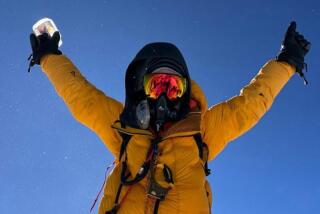Avalanche triggered by Nepal quake strikes Everest base camp
He thought it was a joke.
Lying down at his camp on one of the approaches to Mt. Everest, Dutch mountaineer Eric Arnold assumed that his friend was shaking the tent. A prank. But then the ground trembled.
“When I zip open my tent, I see avalanches coming down on three sides,” Arnold wrote later on his blog.
A cloud stirred by the racing debris rose and caught Arnold as he ran for cover.
“I am completely disoriented and run against Moulay’s tent,” he wrote. His ears filled with snow.
The avalanche was unleashed by a powerful quake that struck about 150 miles away and killed at least 1,800 in several countries. It came a week after the first anniversary of a snow and ice fall that killed 16 Nepalese guides, one of the worst disasters in the modern history of climbing Everest.
In the avalanche that hit the base camp Saturday, 17 people were confirmed dead, according to Nepalese officials and climbers, and others are unaccounted for or stranded on the mountain.
One avalanche struck above base camp on the southern route to Mt. Everest. There were at least 1,200 people at the base camp Saturday, including cooks, porters and guides. It is the height of climbing season on the world’s tallest mountain.
Reaching their social media accounts from some of the highest reaches on the planet — the base camp is at 17,500 feet — people blasted out almost immediate, gripping accounts of the confusion and fear that followed the fall of snow, ice and rock.
Among the climbers on the mountain Saturday was Bay Area resident Dan Fredinburg, a strapping thrill-seeker who wrote on his Linked-In profile that he led an “adventure team” for Google that embarked on expeditions to bring back “stunning imagery from the planet’s most remote regions.”
He also led multiple expeditions to gather images of a region around Everest, for use on the “Street View” function of Google’s maps.
Fredinburg, who had been in Nepal for about 20 days, chronicled his trek online, on Tuesday posting a photo of blue, green and yellow flags draped across helmets, poles and other equipment:
“We piled up our gear on the altar to have it blessed. Lama Dawa Rita, a Sherpa from our Gurka team, asks the Goddess Everest for permission for our team to step through the ice fall soon.”
The Khumbu Icefall is the forward edge of a glacier just above base camp.
On Friday, the day before the quake, Fredinburg posted a photo of himself drinking from a metal cup: “Ice training with @micbattelli means frequent stops for morning cappuccino, regardless of danger.”
That danger came about noon the next day.
Arnold’s narrative, translated from Dutch, describes the chaotic scene after the avalanche swept down the mountain:
“There is barely any visibility. Tenzi falls into an ice lake, Arnold too. I step into a glacier crack. Finally we see people.
“It seems for a moment as if a body is being dragged, but fortunately the Sherpa only has a leg injury. We give him a strong pain killer and help him down. Three times I get very scared when there is an aftershock and avalanche. It’s like being run over by a freight train. We huddle together but it’s not that bad.
“We’re told there are other climbers higher up on the mountain, we won’t be able to reach them now.”
Arnold discovered that his camp, though enveloped by the cloud kicked up by the avalanche, escaped a direct hit. He and other climbers began to search for victims.
“I would want people to do the same for me,” he wrote.
They found devastation. Base camp, he said, looked like a refugee camp. The impact had strewn tents, personal belongings and climbing gear everywhere.
Many victims had head injuries, Arnold said. Some people fled in a panic, while others scrambled to get
gear for the cold night ahead.
“There may be about 10 to 30 fatalities,” Arnold wrote. “A Japanese man shows me horrid pictures on his phone that make me shudder.”
On the way back to his tent, Arnold checked the crumpled tents for sleeping bags and down packs that he could use in an emergency shelter, terrified that he would find a body.
“What a hell,” he wrote.
Posts on social media shared similar experiences, complete with photos of smashed yellow tents and gray disjointed poles stabbing into the air.
“Huge disaster,” mountaineer Alex Gavan tweeted. “Helped searched and rescued victims through huge debris area. Many dead. Much more badly injured. More to die if not heli asap.”
Others posted online to let people know they weren’t hurt.
“Walking back from camp 1 in EB,” tweeted Jelle Veyt. “A major earthquake occurred followed by a massive avalanche. Ran for my life.”
One woman took to Facebook to relay news from a climbing team unable to contact friends and family members.
“The Alpine Ascents International Mt. Everest climbing team was in the icefall and is now safe at Camp 1, avoiding the avalanche that hit Base Camp due to an earthquake in Nepal near Kathmandu,” she wrote. “I’ve tagged those I know ... in an effort to provide their family and friends with an update that the team is OK.”
On Saturday afternoon, Fredinburg’s sister Megan turned to social media too.
“This is Dans little sister Megan,” she wrote on his
Instagram account. “I regret to inform all who loved him that during the avalanche on Everest early this morning our Dan suffered from a major head injury and didn’t make it. We appreciate all of the love that has been sent our way thus far and know his soul and his spirit will live on in so many of us.”
Fredinburg’s various social media accounts paint a portrait of a man at the height of life, in an interesting business, technology and the outdoors. The Linked-In profile lists previous occupations that included “IT Consultant” and “Software Engineer” as well as “Apprentice Carpenter” and “Farm Hand.”
One of his friends, Breton Carasso, said Fredinburg had been to Everest before.
“Never have I met a man with so much excitement for pushing his own limits and ideas,” he wrote on Instagram. “After almost getting caught in the tragic ice fall last year on Everest he decided to go back again this year and try once more.”
On Everest, it’s unclear how many remain on the mountain, or when help might reach them. “I have no idea how I will get out of here,” Arnold wrote.
He also wondered about the toll yet to be discovered.
“I think much is hidden by the snow.”
Twitter: @parviniparlance
@cjwilliamslat
More to Read
Sign up for Essential California
The most important California stories and recommendations in your inbox every morning.
You may occasionally receive promotional content from the Los Angeles Times.












